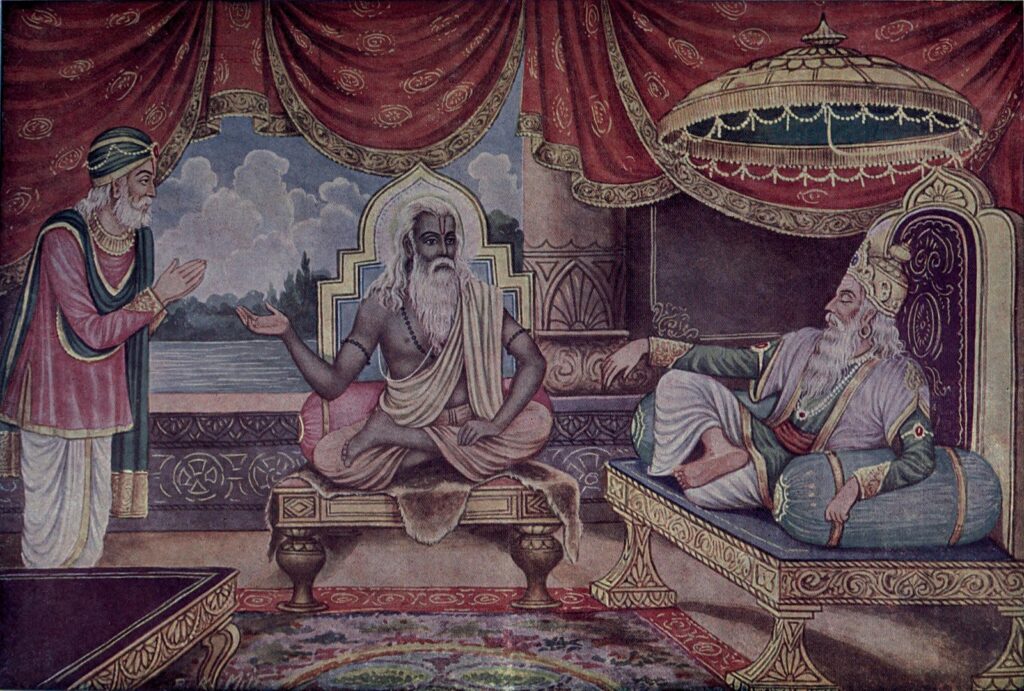Sanjaya Consoles Dhritarashtra

When Sanjaya (the son of Gavalgana) heard his king wail and sigh like a serpent, he consoled Dhritarashtra with these words of great importance.
Note: Sauti narrated to the ascetics in Naimisha Forest, the words spoken by Sanjaya to King Dhritarashtra. The words below were spoken by Sanjaya to console the king.
O King, you have heard Ved Vyasa and Sage Narada speak of immensely powerful men who have exerted great effort in the world. These men, who were born into grand royal families shone with worthy qualities. They were well-versed in the science of celestial weapons. They were akin to Indra in their glory. They conquered the world with justice, performed sacrifices with fit offerings to the brahmanas, and were greatly renowned in the world. But, in the end, they had to succumb to the influence of time.
Note: Sanjaya names a few such great kings to Dhritarashtra. I have listed them in bullet points for ease of comprehension.
- Saivya: the valiant maharatha.
- Srinjaya: one of the greatest conquerors.
- Suhotra, Rantideva, and Kakshivanta: kings that were great in their glory.
- Valhika, Damana, Saryati, Ajita, and Nala.
- Viswamitra: the destroyer of foes.
- Amvarisha: of immense strength.
- Marutta, Manu, Ikshaku, Gaya, and Bharata.
- Rama: the son of Dasaratha.
- Sasavindu and Bhagiratha.
- Kritavirya and Janamejava: the greatly fortunate kings.
- Yayati: who was assisted by the celestials in performing sacrifices and by whose sacrificial altars were spread across the entire earth.
When Saivya was afflicted due to the loss of his children, Rishi Narada told him the story of these twenty-four kings.
There were many other noble-minded and virtuous kings who lived before these great monarchs. They were:
- Puru
- Kuru
- Yadu
- Sura and Viswasrawa of great glory
- Anuha
- Yuvanaswu
- Kakutstha
- Vikrami
- Raghu
- Vijava
- Virihorta
- Anga
- Bhava
- Sweta
- Vripadguru
- Usinara
- Sata-ratha
- Kanka
- Duliduha
- Druma
- Dambhodbhava
- Para
- Vena
- Sagara
- Sankriti
- Nimi
- Ajeya
- Parasu
- Pundra
- Sambhu
- The holy Deva-Vridha, Devahuya, Supratika, and Vrihad-ratha
- Mahatsaha
- Vinitatma
- Sukratu
- Nala: the king of the Nishadas
- Satyavrata
- Santabhaya
- Sumitra
- The chief Subala
- Janujangha
- Anaranya
- Arka
- Priyabhritya
- Chuchi-vrata
- Balabandhu
- Nirmardda
- Ketusringa
- Brhidbala
- Dhrishtaketu
- Brihatketu
- Driptaketu
- Niramaya
- Abikshit
- Chapala
- Dhurta
- Kritbandhu
- Dridhe-shudhi
- Mahapurana-sambhavya
- Pratyanga
- Paraha
- Sruti
O great one, even before these, there were hundreds and thousands and millions of kings of great power, wisdom, valor, generosity, magnanimity, faith, truth, purity, simplicity, and mercy who could not avoid death. Their records have been published by sacred bards of former times. They all met the same fate in the end, even though they were blessed with every virtue.
On the other hand, O King, your sons had an evil disposition. They harbored the desire to harm others and were inflamed with great passion and greed.
You are intelligent, wise, and well-versed in the sastras, O king. Those whose understanding is guided by the sastras never sink under the pressure of misfortune. You know that fate is sometimes kind, and sometimes, severe. Nobody can avert the decrees of fate. Nobody can change the way marked out for him by Divine will. Therefore, it is not appropriate for you to grieve for that which had to happen.
Existence and non-existence, pleasure and pain: everything is rooted in time. It is time that creates everything and it is time that destroys it also. It is time that burns creatures and it is time that extinguishes the fire. All states (the good and the evil), in the three worlds, are caused by time. Time destroys things and creates them anew. Time alone is awake when all things are asleep. No one can overcome time. Time passes over all things without stopping. You know very well, O great King, that everything in the past, present, and future are offsprings of time. Do not throw away your reason, O King, and fall into such intense grief.
Note: After narrating the words of Sanjaya, Sauti tells the ascetics in Naimisha Forest, that Ved Vyasa took these principles as a fact and composed a holy Upanishad (the Mahabharata) that was published to the world by the sacred bards, in the Puranas composed by them.
Previous: Dhritarashtra’s Lamentation: A Summary of Main Events till the end of the War
